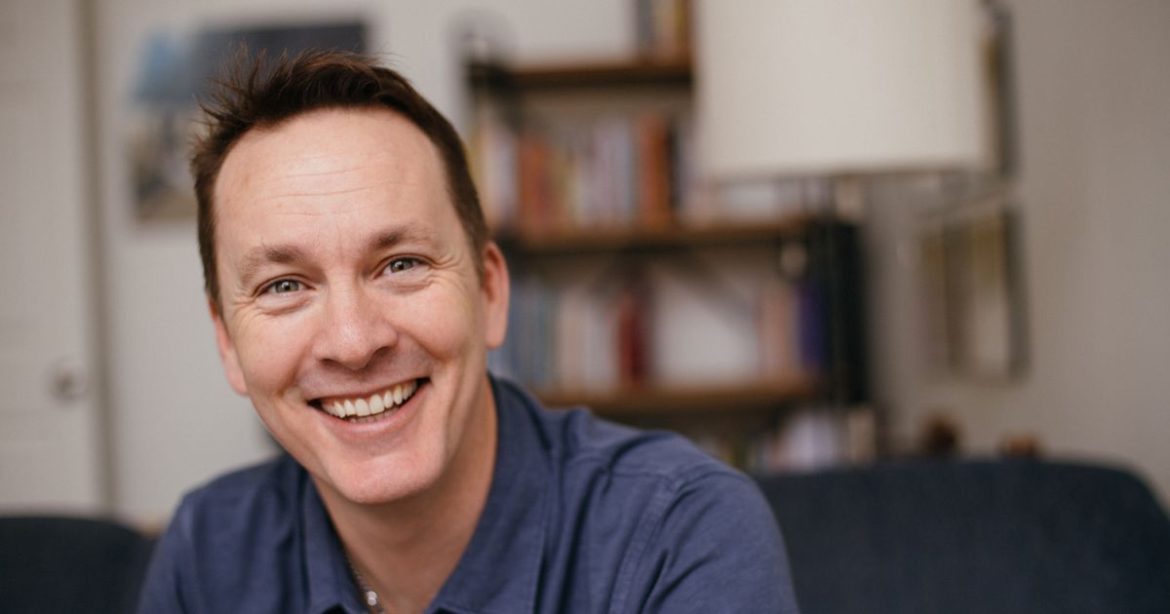Through Unreconciled, Jay Sefton has not only reclaimed his own voice but also provided audiences with a rare space to sit with difficult truths, laugh, reflect, and converse
When theatre audiences settle into their seats, they rarely expect to confront the raw, personal experiences of the performer before them. Yet that is precisely the space that Unreconciled, a new one-man play by Jay Sefton, creates. Opening at the Lyric Theatre as part of the Belfast International Arts Festival, the production is a deeply personal story which explores childhood sexual abuse, faith, and the long road toward reclaiming one’s voice.
Set in 1980s Philadelphia, the play follows Sefton’s younger self, cast as Jesus in a school Passion Play, through decades of silence, reflection, and participation in a church compensation programme. Yet while the subject matter is undeniably heavy, the production is far from a bleak recounting of trauma. Dark humour and moments of levity punctuate the narrative, offering audiences a fuller, more human view of pain, resilience, and the power of storytelling.
Unreconciled is the product of collaboration between Sefton, co-writer Mark Basquill, and director Geraldine Hughes, whose own solo show, Belfast Blues, inspired Sefton to take the stage. It is a play rooted in lived experience, yet designed to foster conversations that extend far beyond the theatre walls, from survivor communities to audiences encountering these stories for the first time.
“There’s something about theatre,” Sefton says. “There’s an urgency and an immediacy to the event. For a long time, it felt like screaming into a void and not having a voice. To see if I could write a play felt like the closest thing to recapturing that voice.”
For Sefton, theatre offered a form of connection impossible to replicate in journalism or literature. “We’re together,” he explains. “We’re in a room together. I remember reading a study done on theatre where, when all the elements are working right, the audience’s heartbeats start to align. I don’t think you can do that with any other medium. There’s something about bearing witness together and I think that’s a uniquely human thing.”
Inspired by Hughes’ solo work, Sefton wanted to explore not just his own story, but the broader impact of trauma on communities. “It was the first time I’d seen a solo show that didn’t feel like a solo show,” he says. “I was intrigued by the challenge of creating something similar, because clergy sexual abuse doesn’t just affect a person; it ripples out into the community.”
Despite the gravity of the subject, humour plays a crucial role in the show. “I think it’s very important for audiences,” Sefton says. “I’m not unaware that there are barriers to entrance for this play. I want it to be a complete theatrical experience, which involves humour. We’re funny creatures and it can’t all be heavy. You need those moments of levity, particularly if you’re going to have the harder moments.”
The title Unreconciled reflects the ongoing nature of healing from trauma. “Trauma and the healing from trauma is a process,” Sefton notes. “To be unreconciled suggests that. I’d like people to have it normalised that, ‘Oh, that thing is still there. I thought I was done with it, and here it is again.’ We’re always becoming, always unfolding, and we need to get good with that process.”
The production is also accompanied by post-show discussions, extending its reach far beyond performance. “The play is a jumping-off point,” Sefton says. “We’ve had other survivors tell their stories, sometimes for the first time. We’ve had family members share the ways this has run roughshod through their lives. And we’ve heard from people who said, ‘I really didn’t want to come tonight, and I’m so glad that I did.’ These conversations are what the play is in service of. All of us talking to one another so it doesn’t remain in the shadows.”
Through Unreconciled, Sefton has not only reclaimed his own voice but also provided audiences with a rare space to sit with difficult truths, laugh, reflect, and converse. “I hope people leave saying, ‘I’m so glad that I was there tonight,’” he says. “And I hope they’re having conversations with each other. We all know people affected by this. If we’re not affected ourselves, we are connected to someone who is. The theatre allows us to recognise that, and to start talking.”
For all the latest news, visit the Belfast Live homepage here and sign up to our daily newsletter here.
#Playwright #turns #story #clerical #abuse #powerful #oneman #show

